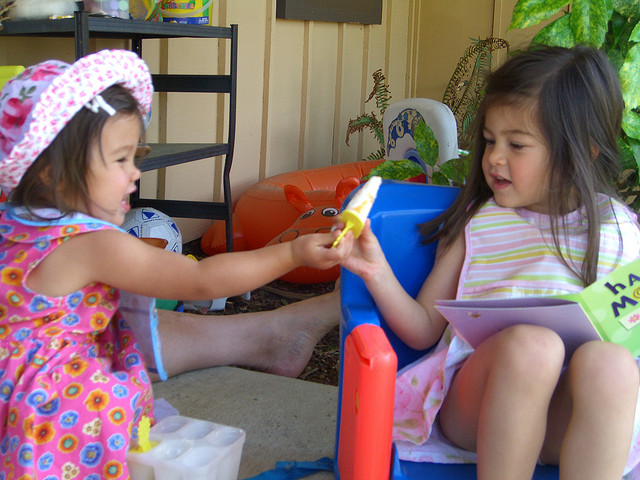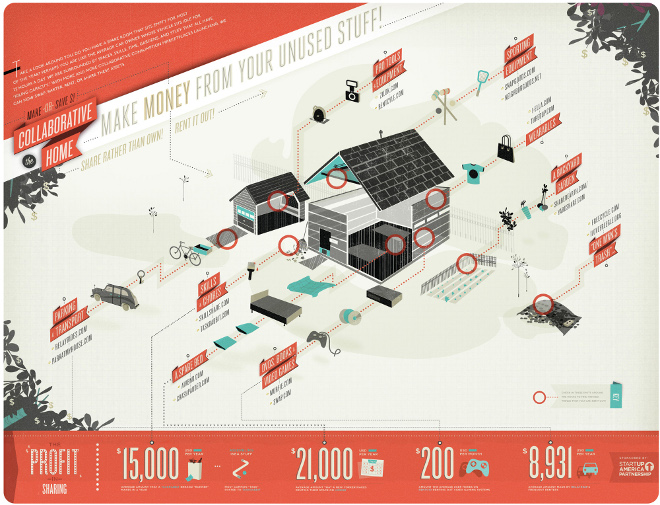
A relationship-based economy asks us to rethink our assets, both what they are and how we use them. In my last post I talked about how timebanking allows us to take advantage of our intangible assets. This week I want to talk about how we can take advantage of our own and our community’s physical assets, better known as “stuff.”
Think of your house. How much of your stuff goes unused on a daily, weekly, monthly, or perhaps even on an annual basis? Now imagine if you could get something in exchange for sharing those items when you’re not using them. Imagine if you could have borrowed those items from someone else in the first place and spared yourself the expense of having to buy your own. The infographic below shows how your home might be a secret cash cow with new websites that facilitate sharing:
A perfect example of an underutilized asset is your car. In North America, most people only use their car 8 percent of the time. That leaves a lot of time when it’s sitting around and could be used by someone else. RelayRides allows users to rent their car to car-less people in their area. Another car-sharing company, ZipCar allows people to ditch the car all together and rent vehicles by the hour when they need them.
Perhaps my favorite sharing start-up is Karma. For most of the day my wifi at home sits unused. Karma is wireless system where you pay by gigabytes used. What’s great is that anyone else can log into my home hotspot and pay a fee to use it. If that happens I get a credit that I can use at my own hotspot or anywhere else I find Karma. Not only does Karma open up my hotspot to others but it opens up tons of new places I can go to access wifi as well.
When I think of unused gadgets in my home, my thoughts automatically go to the kitchen. While I love my pasta maker, tortilla press, and ice cream maker, the truth is I don’t use them every day or even every week. Imagine having a cooking library where I could rent these things out when I need them. There are already tool libraries around the country where people can check out the tools they need. Really, how much use can you get out of a tile saw once you’ve finished your bathroom renovation?
The sharing economy is not only transforming how we live but how we work. In co-working spaces people come together to share office space and supplies. Recently, I had a chance to visit Virtually Sisters, a new co-working space in Staunton, Virginia. Artists, consultants, nonprofit staff, entrepreneurs, and sundry others come together to share a store front that is transformed into an office space, a meeting room, an art gallery, bike parking, a pop-up retail store, a classroom, a production studio and more. The space allows everyone to be able afford a store front on main street.
Another great co-working idea is Incu-BaKe, an industrial kitchen shared by food entrepreneurs. In addition to a kitchen, Incu-BaKe clients are able to share ideas, connections to local suppliers, and business clients. Co-working spaces helps businesses succeed by cutting down on costs, building collaborations, and accessing new resources.
With the current state of the economy many of us are forced to go without a lot of luxuries A sharing economy increases the resources available to people in the community without actually creating new resources. It’s a perfect example of the ability of a relationship-based economy to increase prosperity without dramatically raising income. It lowers the cost and increases the accessibility to the tools we want or need for life and work. Furthermore it builds relationships where we can share more than just stuff, we can share ideas, networks, and friendships.
By sharing we rethink prosperity: no longer is it something to be built and enjoyed by the individual, but something we can build together. Through sharing we can find and use our community’s assets to meet our needs and meet new people along the way, which improves the quality of life for everyone. It’s a great example of how the solution to the economic crisis may not solely be figuring out how to increase the amount of monetary wealth a person has, but rethinking how we use the wealth that already surrounds us.

